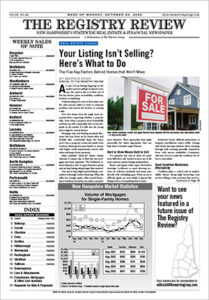
Many local Realtors don’t subscribe to doomsday predictions about the future of buyer agency, but most predict the current commission structure is headed for the exit. iStock illustration
New Hampshire real estate industry leaders are nervously hoping that a recent federal court ruling won’t lead to a major overhaul of how buyer agents are compensated in coming years.
The entire industry was shaken this fall when a federal jury in Missouri ruled that the National Association of Realtors and several large brokerages had conspired to inflate the commissions paid to real estate agents.
The anti-trust ruling took direct aim at the industry’s so-called “cooperative compensation rule,” which calls for home sellers to pay for the commissions of buyer agents, as well as commissions for their own listing agents. Critics of the cooperative-compensation system claim it has effectively led to collusion among agents and excessive fees.
The NAR and brokerages were ordered to pay damages of nearly $1.8 billion – a figure that could rise to more than $5 billion if treble damages are awarded.
The NAR has vowed to appeal the court decision, which only covers Missouri but is expected to set the pattern for a host of other national and state-level lawsuits challenging the same compensation structure.
Realtor Leader Urges Calm
In a recent online interview hosted by New Hampshire Association of Realtors president Ben Cushing, the NHAR’s legal counsel, Matt Johnson, said future legal challenges to the ruling could take three to five years to resolve, so no immediate action is needed to formally change how real estate transactions are conducted across the state.
“This is the very beginning of this dispute,” Johnson said in the NHAR video. “The good news is that the agents and brokers of New Hampshire do not have to do things differently.”
In a statement to the Registry Review, Cushing expressed confidence that the current deal-making process in New Hampshire, if followed closely, is proper and fair when it comes to commissions. The standard forms NHAR offers its members “are designed to be transparent” to buyers and sellers he said, and the commission negotiation process creates room for competition.
“It’s important to understand that there is no ‘standard’ commission rate, that each transaction is independent and negotiable,” he said. “Buyers and sellers are counseled to understand the commission statements, and both have to sign off before the transaction moves forward. If the terms aren’t acceptable, they are welcome to negotiate. There are various models, including entry-only, discount, and full-service, and the rate typically associated with each is commensurate with the level of service.”
But while the NHAR has been counseling calm following the anti-trust ruling, some are wondering if the adverse court decision could indeed lead to major changes within the industry.
Even before the NAR ruling came down in late October, researchers at the investment firm Keefe, Bruyette & Woods warned that a trio of lawsuits over agent commissions, including one involving Massachusetts’ main multiple listings service, could lead to an exodus of more than 1 million agents from the industry nationwide.
Local real estate agents aren’t buying into such worst-case scenarios.
Stephan Morrissey, a broker with Allison James Estates and Homes in Nashua, said he’s taking a “wait-and-see” approach to how the recent court ruling might play out.
But he indicated he doesn’t see buyer agents disappearing in large numbers from the industry scene, saying they’re needed and help with the overall home-buying process.
Instead, he said he expects that listing and buyer contracts will be more clearly written in the future as a result of the ruling, outlining the exact details of negotiated commissions, fees and the services provided by agents.
“I see the language changing,” he said. “I believe it’s all about transparency and I see that improving” in coming years.
Morrissey added: “Do I see some changes coming? Yes. Significant changes? Maybe not.”
A Thorny Topic Over Time
Having working in the real estate industry since 1978, Morrissey said how selling agents compensate other agents has been a source of discussion and debate over the decades.
“It’s always been a problem,” he said of buyer-agent pay practices.
Adam Dow, who runs The Dow Group-Keller Williams Coastal and Lakes & Mountains Realty, expressed frustration with the recent jury ruling, saying that the current system is fair – and that it works.
“As an agency, we didn’t do anything wrong,” he said. “The lawsuits are trying to break down the process we put in place to protect buyers. They’re taking things out of context to make something look bad. … I don’t think changes should come.”
But if there are changes, Dow said they could end up hurting buyers, who need representation in sometimes thorny real estate transactions.
“The major theme I’m hearing is just explain [contract details] better,” he said.
Big Changes Coming?
Across the state, some real estate agents do see possible major changes occurring, such as a return to possible buyer-agent fees, paid by buyers to their agents, a practice that was more common decades ago.
Such a buyer-pay structure would resemble how tenants currently pay their agents in apartment rental deals.
Meanwhile, others have suggested that perhaps lawmakers in Washington D.C. will allow buyer fees to be rolled into mortgage finance deals.
But Anthony Panebianco, a land-use and real estate litigator at Davis Malm in Boston, said congressional action is “very unlikely.”
Instead, Panebianco, in a recent interview, said he sees other major compensation changes coming within a year, not multiple years, due to the high monetary stakes involved.
The $1.8 billion verdict in the recent NAR case – a verdict that could exceed $5 billion if treble damages are awarded – could spur large real estate brokerage firms to alter their compensation rules to avoid potentially expensive legal entanglements.
“Patience is sort of the watchword right now,” he said. “The recent legal [actions] haven’t created a panic, but they have raised concerns. The industry knows it has reached a tipping point.”

